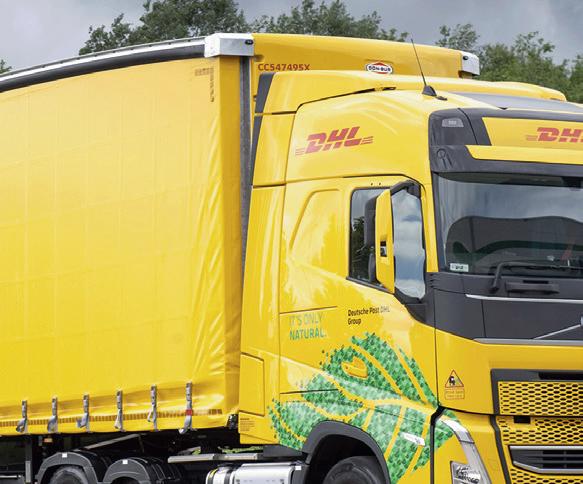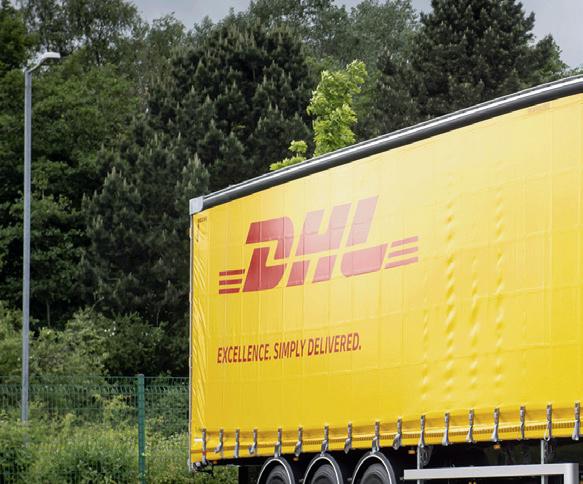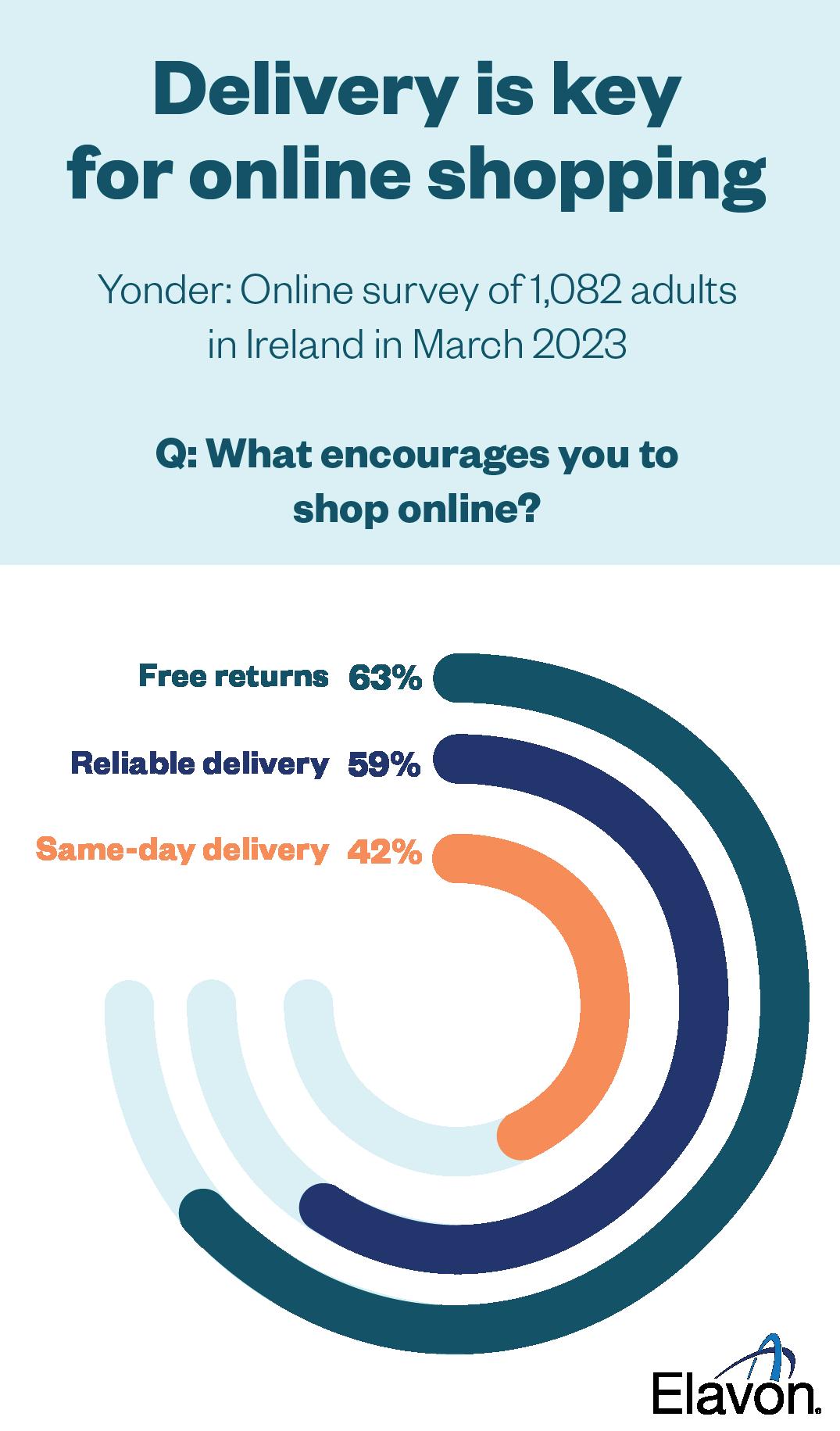






Future of Retail and eCommerce Q3 2023 | A promotional supplement distributed on behalf of Mediaplanet, which takes sole responsibility for its content “For retail businesses... the coming years will present fresh hurdles — but also opportunities.” Arnold Dillon, Director, Retail Ireland, Ibec Page 02 “Few could have predicted the exponential growth in eCommerce over the last few years.” Lorraine Higgins, Founder, Digital Business Ireland Page 06 www.businessnews.ie Your partner in payments Visit www.aibms.com to find out more First Merchant Processing (Ireland) DAC, trading as AIB Merchant Services, is regulated by the Central Bank of Ireland. In-Store • Clover On-Line • Authipay On-The-Go • Clover Flex When you’re talking about money, as a small business, it’s so important we get everything right. Read more on pages 04 - 05 Steph Giordano Founder and Creative Director, Baked by Steph Image provided by Elavon
As we near the year-end and welcome the winter season, it’s vital to strengthen your employee engagement strategy through rewards and recognition.
Nicole Roche, Senior Business Development Representative at One4all Rewards, explains:
“A significant development for business owners came into effect at the end of last year through benefit-in-kind (BIK), which might just be the answer to bolstering employee morale and loyalty.”
You can gift an employee up to €1,000 tax-free
You can now gift an employee up to €1,000 tax-free, thanks to the increase in the BIK limit. This change allows businesses to reward their employees with up to €1,000 per annum in gift cards, exempt from tax, PRSI and USC charges — potentially saving up to €1,313.54* per employee.
Fundamental sense of belonging
Investing in your employees fosters belonging and loyalty. It can positively impact retention rates and reduce recruitment and training costs. Nicola emphasises: “Appreciating and acknowledging your staff isn’t just a nice gesture; it’s fundamental. In the dynamic world of business, nurturing a motivated and engaged workforce is key. Celebrate your employees, as they are the heart of your accomplishments.”
Customisable gift card option
The One4all Gift Card can be loaded from €15 to €150. Its digital counterpart can be tailored with a personalised video message from you, on behalf of your business, or customised with a photo of your company logo — easily sent by text or email. For higher-value loads over €150, the One4all Chip & PIN option is available in physical or digital reloadable format.
Gift cards over €150 currently require photo verification as part of customer due diligence. If employees already received one of these cards last year, their photo verification is valid for up to four years from the date of validation. Seizing the opportunity to reward employees is an investment that pays dividends in the form of a happier, more engaged and motivated team.
*Figure of €1,313.54 is based on giving €1,000 net to an employee on the 40% tax band paying full PRSI and USC. The maximum reward of €1,000 can be split across two payments in one financial year.
Nicole Roche Senior Business Development Representative, One4all Rewards
Trends in retail are now pointing in a positive direction
The volatility caused by Covid-19 and then the war in Ukraine demanded major interventions by the Government to support businesses and consumers, but the trading environment has now improved.
Retail trends normalising after period of flux
We should be looking towards a period of steady growth in the retail sector, although the recent increases in interest rates and high inflation have left many consumers cautious. There are reasons to be positive, though. The wider economic fundamentals remain sound, employment figures are strong and look set to remain so, and public finances are healthy.
More importantly for the performance of retail, wage growth is beginning to rise in real terms, after accounting for inflation. This will support consumer spending as we move towards the key Christmas trading period.
Improvement over the last year
The positive backdrop has led consumer sentiment to steadily improve over recent months; most are confident that the worst of the inflationary spike is behind us. However, we still have some way to go to fully recover from the low of last September.
Since then, inflation has eased significantly across the economy, translating into broadly positive retail sales trends over recent months. Consumer spending should grow by about 4.2% this year, easing back slightly to around 4% next year.
Industry changes demand additional investment
Beyond the more immediate retail trends, the sector continues to be on a journey of fundamental change. While we have seen a return to more typical shopping patterns post-Covid, digital technology continues to dramatically challenge existing business models. Online sales as a proportion of overall sales continue to rise, and the speed and ease of online shopping continue to improve.
For many businesses, keeping pace is demanding major, new investments in digital channels and their in-store experience. For others, these shifts offer new ways to reach consumers that were not possible previously.
Other key aspects of retail businesses are also demanding significant additional focus and investment. The transition to a low-carbon economy will require a fundamental change to how many businesses operate, while skills shortages remain acute in many areas.
For retail businesses that have successfully navigated the volatility of recent times, the coming years will present fresh hurdles — but also opportunities. A wider economy that is performing well will support the development of the sector as consumer, employment and environmental change requires a new focus on transformational investment.

For more information, email corpsales@one4all.ie or visit www.one4allrewards.ie to place your order today.
Paid for by One4All
Project Manager: Jen Church jen.church@mediaplanet.com
Business Development Manager: Samantha Taylor Managing

Director: Alex Williams Country Manager IE: Ross Bannatyne | Head of Print & Design: Thomas Kent Designer: Aimee Rayment
Content Editor: Angelica Hackett O’Toole | Head of Digital Operations: Harvey O’Donnell Paid Media Manager: Jonni Asfaha
Social & Web Editor: Henry Phillips Digital Assistant: Carolina Galbraith Duarte All images supplied by Gettyimages, unless otherwise specified | Contact information: uk.info@mediaplanet.com or +44 (0) 203 642 0737
02 READ MORE AT BUSINESSNEWS.IE AN INDEPENDENT SUPPLEMENT FROM MEDIAPLANET WHO TAKE SOLE RESPONSIBILITY FOR ITS CONTENT MEDIAPLANET
@businessnewsIE @MediaplanetUK Please recycle
After a few years of major economic upheaval, retail and consumer trends have normalised over recent months.
Arnold Dillon Director, Retail Ireland, Ibec
Benefit-in-kind update: why it’s a great time for businesses to reward employees
Ireland takes a significant step towards sustainable road transport
To help Ireland reach its ambitious climate targets, DHL is investing in biomethane-fuelled trucks to decarbonise the retail transport sector.
DHL Supply Chain recently announced plans to begin operating biomethanefuelled trucks. With an investment worth €80 million into a dedicated biomethane production facility in Cork, this highlights the growing momentum behind sustainable road transportation in Ireland.



Reducing road transport emissions
The facility will convert 90,000 tonnes of industry and consumer food waste — which could otherwise have been sent to landfill — into enough biomethane to fuel 150 trucks annually. The carbon emission reductions from this project are significant; the equivalent of over 38 million miles driven by an average petrol passenger vehicle car. The fuel will initially power 92 trucks for DHL’s retail transport operations. This will decarbonise a significant proportion of the retail transport sector in Ireland. DHL intends to continue to roll this out to all the other sectors in which they operate — consumer, technology, aviation, life sciences and healthcare.
The journey to net zero


The rollout of biomethane trucks and investment in biomethane


production plays an important role in supporting DHL’s global environmental targets. The company aims to achieve net zero emissions across its operations by 2050.
Ciaran Foley, Managing Director of DHL Supply Chain, Ireland, says: “This is a major milestone, not only for our operations but for our customers. The investment in domestic biomethane allows us to help businesses across Ireland significantly reduce the carbon impact of their road transport networks.”

Sustainable business practices are increasingly important to Irish consumers. The switch to cleaner transportation alternatives by leaders like DHL shows that commercial viability and environmental stewardship can go hand-in-hand.
How to craft a better retail experience with strategic design
Retailers must embrace holistic design that seamlessly blends the physical and digital realms, say two Directors from an award-winning Irish design agency. These multifunctional spaces will encourage customers to visit, dwell and purchase.
What is ‘strategic design’ and why is it key to a better retail experience?
Niamh Higgins: Strategic design is evidence-based. It begins with a deep understanding of our client’s goals and objectives. Strategy asks questions that leads to different thinking and compelling solutions. It goes beyond aesthetics to optimise the shopping experience and create a well-considered customer journey. It’s the foundation upon which we build exceptional retail experiences.
Gemma Ní Maoltuile: Delivering a commercial return requires databased and measurement-based thinking. That means studying a client’s brand and customers in nuanced detail, which results in the right design solutions that can drive footfall and increase sales.


How does strategic design work in practice?
NH: First, through a ‘discovery process,’ we work with the client to delve into their brand’s essence. By defining brand fundamentals, we uncover what makes them unique. It’s important to identify their key audience, along with their needs and desires. This clarity is crucial for creating cohesive retail experiences that authentically represent the brand.
What is ‘the brand experience’ and how does it impact retail?
NH: The brand experience encompasses the sum of all touchpoints — where a brand interacts with its audience, both offline and online. For
instance, customer service, in-store environment and website navigation. These interactions create a lasting impression of a brand.

Brands must transcend the traditional ‘omnichannel’ approach, which focuses on presence across channels, and embrace the novel ‘metachannel’ strategy — seamless integration across all touchpoints. This paradigm shift requires retailers to harness the power of data and creativity to reimagine and meld experiences around the consumer.
GNM: So, we’ve developed a holistic Brand Experience Audit Tool, which audits impact across all touchpoints — physical and digital — and gives the client a brand experience score. This benchmark allows transformation to start.










How do you see retail design shaping tomorrow’s experiences?
NH: Consumers are more discerning than ever, searching for experiences that are authentic and relevant. To stay ahead, retailers should adopt strategic retail design to create experiences that become ingrained in the memory of that place, at that time. Design for circularity will be key. For instance, modular solutions with materials that are sustainably sourced or designed for reuse and longevity. Crucially, tech-enabled spaces should serve all users; regardless of ability, age or culture. Retailers with versatile and adaptable spaces will emerge as key players — now and tomorrow.
WRITTEN BY: Tony Greenway



MEDIAPLANET READ MORE AT BUSINESSNEWS.IE 03 AN INDEPENDENT SUPPLEMENT FROM MEDIAPLANET WHO TAKE SOLE RESPONSIBILITY FOR ITS CONTENT
@ECOMBUSINESSLIVE | #eComBiz com BUSINES S LIVE THE LEADING GLOBAL EVENT TO ACCELERATE YOUR ONLINE BUSINESS SALES REGISTER FOR FREE TICKETS RUNNING ALONGSIDE 2023 MESSE FRANKFURT 11th & 12th OCTOBER
Advertorial Scan the QR code to find out more Paid for by DHL Image provided by DHL
Ciaran Foley Managing Director, DHL Supply Chain, Ireland
Paid for by TapCreative Find out more at tapcreative.ie
Niamh Higgins Managing Director, TapCreative Gemma Ní Maoltuile Client Director, TapCreative
How a love of baking shared on social media became an eCommerce empire
Scaling up, at pace, from a hobby on social media into a full-on bespoke baking eCommerce business, Steph Giordano wanted to give her customers the best buying experience and have a payments platform ready for whatever the future brings.


Business started completely as a happy accident, says Steph Giordano, founder and creative director of Baked by Steph. “I’ve always absolutely loved baking and started an Instagram account back in 2018. It really was just for my mum and friends to keep track of my hobby.”
From hobby to baking eCommerce

“Before I knew it, I had a few thousand followers in just a couple of weeks. Then, I got a really big inquiry from a corporate client, and that’s the point at which I knew this could be a full-time career.” That leap of faith was in 2019.
Demand grew exponentially during the pandemic. Today, Belfast-born Steph has a team of 16, creating more than 1,000 personalised cookies, cakes and macarons every day. Selling online and over the phone, business is thriving; from the cheeky messages to loved ones spelt out in biscuit form — which saw many of Steph’s early creations go viral on Instagram — to one-off designs for weddings, birthdays, press launches and corporate events for well-known household brands.
Ingredients for eCommerce success
“Our relationship with Elavon came about when we decided to scale up and build ourselves a new website,” says Steph. They provide Baked by Steph with an eCommerce solution that brings all the business’ platforms together.
It fully integrates with the website to make secure payments easy for Steph’s team and their customers, whatever currency they’re paying in. Customers can also pay over the phone or through a link shared securely by email or text message.
Money goes into Baked by Steph’s account the very next day, helping with cash flow, while Elavon’s online reporting tools allow the business to keep track of every sale and transaction. “They were able to talk me through the entire process, show me forecasting and numbers … making it easy for me to make a decision which, as a business owner, is what I’m always looking for. I don’t have time to research everything in depth.”
Making business easier
“Elavon kept us right, every step of the way. That was fantastic for me and my team in terms of learning how to use this new platform and making sure we understood everything,” adds Steph. “At the end of the day, when you’re talking about money, as a small business, it’s so important we get everything right,” she insists.

“Not only have we found the reporting process of our website sales much easier, but we’ve also found the reconciliation side of things for our bookkeeper much easier as well. We get next-day payments, which really helps with our cash flow.”
Sweet experience all around
“Building this whole eCommerce website and finding the right partner, it was important to find a solution that facilitated an easy checkout process. It ultimately makes our customers’ lives easier, so they can get the end product a lot faster,” says Steph. “It allows me much more time to focus on what I love, which is decorating the cookies and baking cakes.”
04 READ MORE AT BUSINESSNEWS.IE AN INDEPENDENT SUPPLEMENT FROM MEDIAPLANET WHO TAKE SOLE RESPONSIBILITY FOR ITS CONTENT MEDIAPLANET
Steph Giordano
Founder and Creative Director, Baked by Steph
Elavon Financial Services DAC. Registered in Ireland – Number 418442. Registered Office: Block F1, Cherrywood Business Park, Dublin 18, D18 W2X7, Ireland. Elavon Financial Services DAC, trading as Elavon Merchant Services, is regulated by the Central Bank of Ireland.
Scan to watch Steph Giordano talk about why working with Elavon was a no-brainer.
Spread
When you’re talking about money, as a small business, it’s so important we get everything right.
paid for by Elavon Europe
James King Head of Professional Services, Elavon
Top tips: how to stop fraudsters from targeting your eCommerce website
Brian Kinsella Senior Regional Fraud Manager, Elavon
Many forms of fraud targeting eCommerce are emerging, and both small and large businesses can be affected. Luckily, there are ways you can stop eCommerce fraud.
Carding is the process where stolen or cloned card details are used to make a small online purchase, to test if a card is valid and active. Often, a piece of automated software will try to make potentially thousands of small transactions until one is successful. Those details can then be used for larger fraud elsewhere.
Consequences of eCommerce fraud
If it later turns out that the larger fraud was carried out because of carding on your site, you could find yourself exposed to reputation and legal implications. You could also face additional fees for excessive authorisations and declines from card brands.
Brian Kinsella, Senior Regional Fraud Manager at Elavon, says: “We often see the types of businesses that fall victim to carding attacks are small companies that may not have invested heavily in website security. By taking a few simple, low-cost steps, you can prevent your business from falling foul of carding and any card fees for excessive declines.”
Ways to protect your business from fraud
There are many ways you can protect your
business from fraudulent carding activity.
• Have a good ‘captcha’ test on your website to frustrate carding attempts. A ‘captcha’ is a way to tell the difference between a human and a robot.
• 3-D Secure is the umbrella name for Visa Secure and Mastercard SecureCode, which have been introduced to add extra security for online shopping. By adding 3-D Secure to your eCommerce, you can fully authenticate the cardholder. While 3-D Secure cannot and does not eliminate chargebacks entirely, it does vastly reduce the incidence of fraud.
• Remove the copy-and-paste function on your payments page to make it harder for an automated script to test transactions.
• Ask your payments gateway provider about other fraud-management products they have available, to identify and block attacks.
As businesses continue to go digital and rely on websites, it is crucial to ensure that you have the necessary security precautions in place. With the right tools and measures, you can protect your business from fraud.
EC
ommerce trends: what are the main reasons people shop online?
Recent research reveals what customers are looking for when they shop online. Findings highlight returns, logistics and web design.
Offering an excellent delivery experience is key to eCommerce, research by Elavon has shown. An online survey of over a thousand adults in Ireland was conducted, and findings reveal what factors make them more likely to choose an online business.


Delivery is key
for customers shopping online
When more than 1,000 adults were questioned, almost two-thirds (63%) of those who answered said that free returns, labels and packaging would encourage them to shop online. Respondents were also keen for returns collected from their house (40%) and a wider range of delivery slots (20%).
James King, Head of Professional Services at Elavon, says: “This really underlines how important it is for you, as an eCommerce business, to develop an excellent relationship with a delivery firm.


“We also see younger shoppers keen for same-day delivery, while a sizeable minority of all shoppers also like that availability. Something to consider — to help you compete with the high street or an edge over your competitors.
“We know people are tightening their belts because of the economic situation, so
you’ve got to work even harder to win over customers.”
Well-designed websites will win customers
The research also shows the importance of the design and writing on your website. Almost a third (31%) of shoppers said more detailed descriptions would encourage them to shop online, and more than a quarter (29%) said better images would motivate them to shop online.
“Understanding what your customers want and need gives you an edge. At Elavon, we continue to research and add to our already considerable expertise, so we understand how best to help you, your customers and our partners.
Combine that knowledge with your own experience, coupled with the data you can pull from our payment packages, and you’ve got a winning combination,” concludes King.
MEDIAPLANET READ MORE AT BUSINESSNEWS.IE 05 AN INDEPENDENT SUPPLEMENT FROM MEDIAPLANET WHO TAKE SOLE RESPONSIBILITY FOR ITS CONTENT
To see the full research, scan the QR code. Research was conducted for Elavon by Yonder, a
of the British Polling
and
its rules.
founding member
Council
abides by
Images provided by Elavon
Every business needs an easy and effective way to hear from their customers. This will lead to improved customer satisfaction and retention.
Every business should seek customer feedback. “After all, without customers, you don’t have a business,” says Emma Harte, CEO of customer experience platform, TellUsFirst. “By listening to what customers have to say, you can quickly identify and address any issues. Ultimately, this will improve customer satisfaction and lead to higher customer retention.”

Research has shown that only 4% of customers will typically complain to a business, 96% won’t complain and 91% will simply not return. Therefore, retention is equally as important as the customer experience itself.
Quick way to increase customer satisfaction
Not all customer feedback is bad. In fact, most isn’t, stresses Harte. But when customers are unhappy and amplify their frustrations online, the reputational fallout can be severe. “It’s unfair because, if customers verbally express their dissatisfaction in-store, you have a chance to rectify the issue. When a business gets a bad review online, there is no second chance.”
TellUsFirst is an online customer feedback platform that allows customers to leave feedback and empowers businesses to act quickly and easily. It offers businesses multiple feedback channels to suit their business model.


Unhappy customers can be contacted within minutes so that any problems can be addressed offline. “Businesses find that if an issue is dealt with or even just acknowledged swiftly, customer satisfaction increases,” says Harte.
Convenient platform for customers and businesses
The platform offers various channels to capture customer feedback effectively, including QR codes on point-of-sale materials or receipts in-store, customer feedback prompts on a website and more. This data can be monitored in real time.

Customer feedback has evolved in the last decade, leaving behind lengthy paper surveys. TellUsFirst, with its smartphone-based approach, pioneers the future for new-age shoppers. “This feedback can affect real, positive change,” says Harte. “Being able to hear the ‘voice of the customer’ by giving them a platform to engage with is vital to improve customer service and retention.”
Businesses across Ireland have become increasingly reliant on digital and social media platforms to reach and retain customers. However, without digital accessibility, they are limiting business.
Amarket of around 600,000 Irish-based customers remains largely untapped.
This is due to the lack of digital accessibility of websites, digital assets and mobile applications. It prevents more than half a million people living with a disability in Ireland from purchasing a product or availing of a service online.

Digital accessibility and eCommerce expansion
Today, most businesses and organisations will have a central digital hub — a website, mobile application, online store or social media account — which facilitates their online presence. These hubs must take digital accessibility into account. Customers may have previously visited physical stores at defined times or sought information via phone. Now, they have access to a digital storefront. In response, consumers across the country have embraced the convenience and flexibility of online shopping.
Cost of eCommerce growth
European accessibility act
Irish businesses have spent hundreds of thousands of euro — or more — enhancing their website design. However, many may not have digitally accessible platforms. Under the European Accessibility Act, the websites of many private sector organisations must be digitally accessible by June 2025. Compliance with the Web Content Accessibility Guidelines 2.1 AA standard will be a legal imperative.
Design disruption enabling accessibility
Our partners at Inclusion & Accessibility Labs (a spin-out of the National Council for the Blind of Ireland) found that 73% of leading Irish companies do not have accessible websites. Their products, services and content cannot be accessed by the 600,000 people across Ireland who live with a disability.
WRITTEN BY Tony Greenway
While the Covid-19 pandemic accelerated this broader trend in consumer behaviour, few could have predicted the exponential growth in eCommerce over the last few years. While the frequency of online purchases has increased substantially, so too has the value of average spend. Research conducted by Digital Business Ireland predicted that approximately 38% of consumers planned to increase their online spend in 2022. Consequently, digital advertising spend in the Irish market reached a high of €861 million in 2022. Businesses are investing more financial resources into driving website and social traffic than ever before.
Digital accessibility presents the greatest opportunity for Irish businesses to unlock access to a market of customers who hold substantial spending power. Moreover, building an accessible website is relatively inexpensive and takes little time with the right strategy and with the right technical experts on board. Businesses must now design their own disruption and seize the opportunity of digital accessibility — before their competitors do.
Lorraine Higgins Founder, Digital Business Ireland
06 READ MORE AT BUSINESSNEWS.IE AN INDEPENDENT SUPPLEMENT FROM MEDIAPLANET WHO TAKE SOLE RESPONSIBILITY FOR ITS CONTENT MEDIAPLANET
Designing disruption: why businesses across Ireland must embrace the opportunity of digital accessibility
Paid for by TellUsFirst rst.com
Why it’s important to give customers a platform to voice their opinion
Emma Harte CEO, TellUsFirst
While the frequency of online purchases has increased substantially, so too has the value of average spend.
73% of leading Irish companies do not have accessible websites.
Scan the QR code to find out more
Four eCommerce strategies to drive growth this Christmas season
There are four digital marketing growth strategies that every retailer should be using this Christmas, according to industry experts.
Many retailers will agree that sales performance over the next few months is critical to success. There’s a quote attributed to Warren Buffet that I love: “Only when the tide goes out do you learn who has been swimming naked.”
The Christmas period does exactly that. Retailers that think long-term will reap the rewards of their hard work. At Wolfgang, our retailer experts have compiled four key strategies and tactics that retailers can action now to set them up for online revenue.

Integrate your customer data
This is an absolute must. Whether you’re using Google Ads, Instagram or TikTok to reach customers, each of these platforms has automated campaign types that use machine learning to serve your ads to the most relevant shoppers. For you to have a competitive advantage here, you need to feed that machine with highly relevant information about your business, so it can make better decisions for you vs. your competitors. A great starting point is to overlay your customer data (CRM data) across the platforms you are using. You’ll get more relevant traffic to your website that converts more efficiently.
Irish companies leading in global retail payments

Ireland has an established reputation as a global hub for companies that are shaping the future of retail payments and eCommerce.
Optimise for new customers
What retailer doesn’t want to maximise the impact of their advertising spend over the next few months? A great way to do this is to focus on new customer acquisition. This allows you to grow your market share. Following our first piece of advice can help you do this when combined with the new customer acquisition campaigns available on Google Ads and Meta.
Know what’s trending
Understand real-time trends throughout the Christmas period. At Wolfgang, we’re big fans of the insights you can glean from TikTok Keyword Insights and Pinterest Trends reports. It allows us to see products or categories that are growing in popularity. This information can then be used by relevant retailers to help maximise their coverage in these areas and piggyback on the trending topics.
Set yourself up for 2024
The smartest retailers will be thinking beyond the Christmas period. There’s no better time to acquire new customers, but you can extend the value of this effort by thinking about how to reactivate these customers next year. Capturing first-party data and growing your CRM throughout the period will allow you to use email marketing and other reactivation strategies in 2024.
Fintech has undoubtedly changed the way we all do business and has had a tangible impact on our daily lives. The development of enterprise, a skilled workforce with strong industry expertise and a vibrant tech sector fuelled by multinationals have contributed to Ireland’s emergence as a fintech leader.
Emerging disruptions in retail payments
Embedded finance, contactless payment methods, digital wallets, branded payments and loyalty programmes are just some of the areas that present opportunity for Irish fintech companies pursuing growth in the retail payments sector.
The landscape is continuously evolving, driven by multiple disruptions including technological, regulatory, economic and social. These disruptions are providing Irish startups and established Irish payments companies with opportunities to introduce new personalised, secure, seamless and cost-effective ways for customers to pay.
Examples of Irish fintech success stories

There are many emerging and scaling Irish-owned companies in this space as well as several major Irishowned players. They provide both retail and business payment infrastructures that enable global, secure, digital customer payment experiences.
These include Kerry-based global payments company Fexco, which offers a portfolio of solutions including currency conversion, international B2B payments and customised omnichannel solutions for specific sectors. Transfermate, which is part of the Kilkennyheadquartered CluneTech Group, is another such example; and they earned unicorn status last year. The B2B payments firm utilises its global licensing infrastructure and banking network to enable cross-border payments in more than 201 countries and 141 currencies — faster and cheaper than traditional methods.

Supporting the Irish fintech industry
Money 20/20 is Europe’s leading fintech industry event. This year, there were more than 100 representatives from 28 Irish-owned and Enterprise Ireland-supported fintech companies at the event in Amsterdam, making it one of the largest national groups in attendance. Exports in fintech, financial and business services by firms supported by Enterprise Ireland rose 14% in 2022 to €2.38 billion, which is further evidence of Irish success in this sector.
Supporting Irish-owned companies to achieve greater scale and expand their global footprint is a priority for Enterprise Ireland in 2023, and our dedicated team is committed to supporting Irish fintech companies on their journey to becoming global leaders.
MEDIAPLANET READ MORE AT BUSINESSNEWS.IE 07 AN INDEPENDENT SUPPLEMENT FROM MEDIAPLANET WHO TAKE SOLE RESPONSIBILITY FOR ITS CONTENT
Karen Cohalan Fintech, Financial and Business Services, Enterprise Ireland
Brendan Almack Managing Director, Wolfgang Digital
Understand real-time trends throughout the Christmas period. Paid for by Wolfgang Digital Find out more at wolfgangdigital.com
Bernie Neville Senior Development Adviser, Fintech, Financial and Business Services, Enterprise Ireland
Resilience of the retailers: how Ireland overcame the challenges of Covid-19 and Brexit
Faced with Brexit, the pandemic, supply chain issues and an energy crisis, Ireland’s retailers have proven their resilience over the past several years.
It is a testament to the strength of Ireland’s retailers that the sector continues to employ over 234,000 people in every corner of the country. Now, facing digitalisation and decarbonisation, the sector is wellequipped to take on the challenges.
Ireland retailers face Brexit and Covid-19

Though it was far from easy, the preparations the retail sector made for Brexit many years ago paid off in dividends. Many retailers began to source more goods locally and from the EU, which then placed them in a position to mitigate the impacts of the supply chain challenges to come.
The pandemic was a huge challenge for the sector. During lockdowns and restrictions, it was the retail sector and its workers that kept food on our supermarket shelves and medicine in our pharmacies. While the majority of us stayed home, retail workers put themselves at risk to keep the country going, and this sacrifice will not be forgotten.
Digital transition in Ireland retail
Many people turned to online shopping during the pandemic; going digital is now vital for Irish retailers. While nothing will replace physical stores, an online presence can complement them. Think of the tourist who
buys an item while on holiday; they can then continue to order from this store and build a relationship with them from afar, for example. Local Enterprise Office or Enterprise Ireland offer support to help retailers through this transition.
Environmental sustainability challenges
Customers are increasingly conscious of the environmental impact of where they spend their money. To ensure the retail sector continues to thrive, it must meet its environmental responsibilities. Like all other sectors, the retail sector is aware that it needs to invest in sustainability and be more environmentally conscious. Support is also available to assist retailers in developing environmental efficiency and improving sustainability.

Growth in the retail sector
The future of any sector is reliant on its talent, and retail is no exception. Opportunities for staff upskilling are crucial. Retail apprenticeships are great for those already in, or even new, to the sector — to gain the necessary skills and climb up the retail ranks.
During recent years, the resilience of the sector has set the groundwork for a bright future, and we look forward to working with retailers in continuing to deliver this.
08 READ MORE AT BUSINESSNEWS.IE AN INDEPENDENT SUPPLEMENT FROM MEDIAPLANET WHO TAKE SOLE RESPONSIBILITY FOR ITS CONTENT MEDIAPLANET
Neale Richmond TD Minister of State for Business, Employment and Retail










































